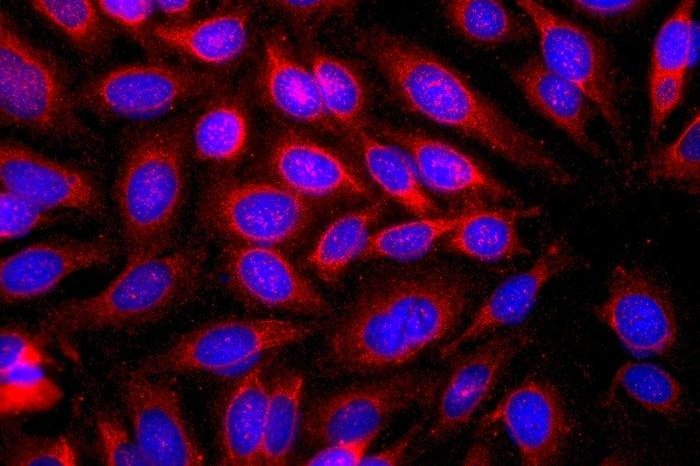Human skin cancer cells are blue and and the IgE antbody is red. Scientists believe the antibody IgE, in red, may protect against cancer, in blue, by defending against the damage caused by environmental chemicals. Photo courtesy of Imperial London College
July 17 (UPI) -- Allergic reactions to component of the immune system may also help protect skin against cancer, according to a study.
These early-stage findings, which were published Monday in the journal Nature Immunology, may lead to new skin cancer treatments, according to researchers led by Imperial College London scientists.
In addition, these defenses might explain why allergies are increasing, the scientists said.
"Our work raises a lot of questions -- and we now have to set about answering them," lead author Dr. Jessica Strid, of the Department of Medicine at ICL, said in a press release. "But the initial results support the so-called Toxin Hypothesis, which suggests that chemicals in the environment, such as those in air pollution, arising from industrial combustion and car emissions, as well as from tobacco smoke, could damage the skin and cause a rise in IgE."
Their research focused on the antibody Immunoglobulin E, or IgE.
As part of the immune system, this protein triggers allergic reactions by incorrectly recognizing a harmless substance, such as peanuts, as dangerous. Under instruction from IgE, the body undergoes skin rashes, or swelling of the face or mouth, and in severe cases blockages to an airway.
"It may be that the IgE would trigger a rash, or a stronger unpleasant response, when the skin contacts something potentially poisonous," Strid said. "This would send a clear message to the body saying this is harmful -- don't touch that again."
The researchers think the antibody may protect against cancer by defending against the damage caused by environmental chemicals.
By accumulating at the skin site, it apparently prevents damaged cells from turning into cancerous tumors, they said.
"IgE must have some important role in the body -- but at the moment scientists are still unclear what it is," Strid said. "We used to think it protects us against parasites -- such as intestinal worms -- and the lack of worm infections is causing the allergy rise. However, after previous work suggested the body can still fight parasites without IgE, we don't now believe this to be the only purpose."
By placing a toxic chemical on mouse skin, IgE presence was induced and traveled to the damage. Then, IgE lowered the risk of cancer development in the skin.
In addition, skin tumors from 12 patients with squamous cell carcinoma, which is the second most common type of skin cancer, were studied. All tumors, some of which were more aggressive than others, had IgE present.
In further analysis of a larger cohort of patients, the researchers found the less dangerous tumors had more IgE-carrying cells but more serious tumors had less.
"This is just the beginning of the story -- our next step is to find out how exactly IgE may stop skin cells turning cancerous, and to see if we can somehow manipulate the allergic response to either protect against, or treat skin cancer," Strid said.















